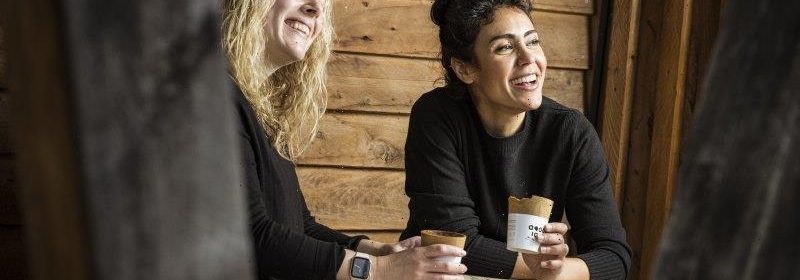Chug, chug, then eat your mug: Edible coffee cup passes taste test

Entrepreneurs Aniyo Rahebi and Catherine Hutchins tried about 250 recipes to develop their edible coffee cup.
Their product had to be strong enough to hold hot liquid, but also had to break down naturally. It had to be tasty enough to be an attractive snack, but not change the flavour of the drink it was holding.
A year after launching Good-Edi cups from a small workshop in Coburg, in Melbourne’s inner north, Rahebi and Hutchins are on course to pass the 100,000 sales mark early next month.
The cups are now stocked in more than 50 cafes across Australia and the pair expect that to rise to 100 by year’s end.
Customers can also order online, and corporate clients have included property developer Mirvac and health insurer Bupa.
Hutchins describes the cup as tasting “like a Weet-Bix waffle”.
Aniyo Rahebi and Catherine Hutchins, founders of Good-Edi edible cups, at Merri Cafe in Brunswick East.Credit:Chris Hopkins
The women say the final formula – made from oats, wheat, flour, water, sugar, salt and coconut oil – stays crispy for 40 minutes. If not eaten, it can break down in less than two weeks in a garden or compost.
They have also launched a chocolate-dipped cup and are considering caramel and cinnamon flavours.
Buying an edible cup adds to the cost of a coffee. Merri Cafe in Brunswick East charges $1.50 on top of the $4.50 cost of a regular latte. Puzzle Coffee in Melbourne Central charges $3 on top of a $4.20 regular latte.
But Rahebi points out that the cup also provides a snack.
Good-Edi cups in the Coburg workshop.Credit:Chris Hopkins
Rahebi and Hutchins became friends while working in a food processing and packaging company. Concerned about the number of coffee cups they saw in bins on their lunch breaks, they set out to create a convenient and sustainable solution.
They launched Good-Edi in June 2021 and Rahebi said most cafes had approached them, rather than them spruiking the product.
Merri Cafe, at the CERES Environment Park, introduced edible cups two weeks ago and now sells about 100 a day, but takeaway customers can also bring their own cups or buy a CERES mug for $3.
On Wednesday, customer Shank Prasad, 23, a university student from Clayton, tasted his first edible cup with his “dirty chai” – an oat chai with a shot of coffee.
Shank Prasad (left) tries an edible cup with his chai as friend Harry Sridhar looks on.Credit:Chris Hopkins
He said the cup tasted “really nice”, like oats and grains, and alongside the chai could make a breakfast. However, he said the $7.20 cost, including the $1.50 cup, would suit an occasional rather than regular purchase.
Liam Taylor, head of communications at environmental foundation Planet Ark, said the organisation had been aware of a growing market for edible cups overseas for a few years.
“It’s great to see a home-grown alternative to single-use now available to Australians,” he said.
Taylor advised consumers to eat the edible cup rather than throw it in a bin, because the latter meant the resources that went into growing the food products and manufacturing the cup were wasted. Throwing out food waste also meant it would rot and produce greenhouse gas.
He said that to ensure your cup of coffee had the least overall environmental impact, Planet Ark recommended using reusable cups wherever possible.
The Morning Edition newsletter is our guide to the day’s most important and interesting stories, analysis and insights. Sign up here.
Most Viewed in National
From our partners
Source: Read Full Article



